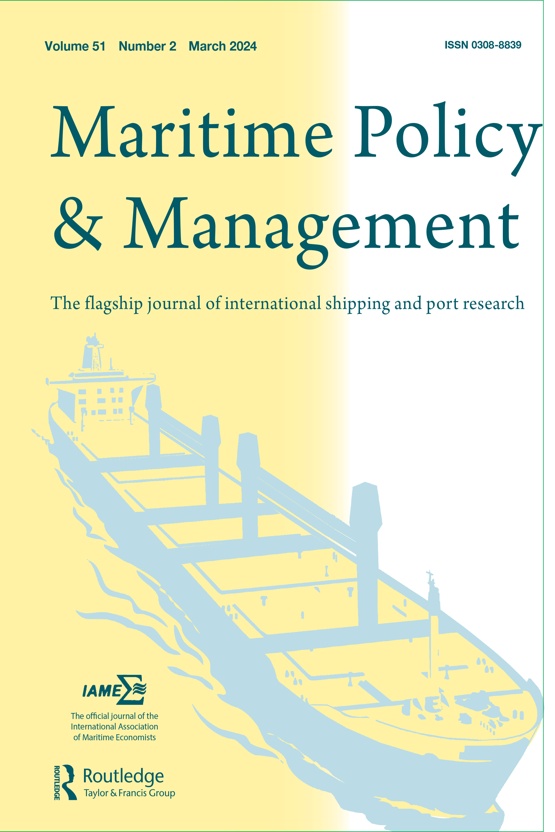Submit a Manuscript to the Journal
Maritime Policy & Management
For a Special Issue on
Digitalisation and Artificial Intelligence in Maritime Transport: Operations, Management, and Policy
Manuscript deadline
01 January 2025

Special Issue Editor(s)
Kum Fai Yuen,
Nanyang Technological University
[email protected]
Jose Escribano Macias,
Imperial College London
[email protected]
Duowei Li,
Nanyang Technological University
[email protected]
Ran Yan,
Nanyang Technological University
[email protected]
T.L. Yip,
The Hong Kong Polytechnic University
[email protected]
Digitalisation and Artificial Intelligence in Maritime Transport: Operations, Management, and Policy
The maritime transport industry stands at the forefront of a technological renaissance, experiencing a transformative wave driven by the integration of digitalisation and artificial intelligence (AI). This paradigm shift holds the potential to revolutionise the maritime sector, enhancing efficiency, safety, and overall operational effectiveness while promoting sustainability and environmental stewardship. Despite the pervasive influence of digital technologies, particularly AI and big data, in various transport domains, the maritime industry remains one of the oldest and most traditional sectors, relying primarily on human expertise and experience rather than extensive data-driven insights.
The integration of digitalisation and AI in the maritime industry brings forth a spectrum of transformative possibilities. On the positive side, these technologies have the potential to revolutionise operations, enhancing efficiency, safety, and overall effectiveness. AI applications, including machine learning and big data analytics, can optimise vessel navigation, streamline port management, and introduce predictive maintenance strategies, contributing to a more sustainable and environmentally friendly maritime ecosystem. However, alongside these opportunities, there are challenges and concerns that warrant careful consideration. Cybersecurity vulnerabilities, ethical considerations, and the potential displacement of certain traditional roles pose challenges that demand careful examination. As the maritime industry stands at the crossroads of embracing these technological advancements, it becomes imperative to comprehensively explore the dual nature of their impacts. This special issue seeks to unravel the complexities surrounding the positive and negative dimensions of digitalisation and AI in maritime transport, providing a nuanced understanding that informs future developments and decision-making processes.
The urgent need to explore, understand, and harness the transformative potential of these technologies in the maritime domain forms the basis for this special issue. Maritime Policy & Management is pleased to announce a dedicated exploration titled "Digitalisation and Artificial Intelligence in Maritime Transport: Operations, Management, and Policy." This initiative aims to delve into the multifaceted aspects of digital technologies and AI in maritime transport, encompassing navigation, vessel operation, port management, maritime logistics, business management, and policy formulation.
Aims and Scope
This special issue aims to achieve the following objectives:
Advance Understanding: Explore the profound impact of digitalisation and AI on maritime transport, advancing our understanding of their applications and potential benefits and negative consequences.
Foster Collaboration: Facilitate collaboration between academia and industry to bridge the gap between theoretical advancements and practical implementation.
Inform Policy and Decision-Making: Offer valuable insights to inform policy formulation and decision-making processes in the rapidly evolving digitalised maritime landscape.
We invite submissions on a wide range of topics, including (but not limited to):
- AI applications in vessel navigation and control systems.
- Digital platforms for vessel tracking, visibility, and maintenance.
- Smart ports and logistics.
- Digitalisation in port community systems.
- Predictive maintenance and condition-based monitoring in maritime operations.
- Explainable AI in maritime systems.
- Big data analytics for maritime safety and efficiency.
- Cybersecurity challenges in digitalised maritime systems.
- Ethical and regulatory considerations in the adoption of AI in maritime transport.
- Impact of digitalisation & AI on maritime training, education, and skill development.
- Case studies on successfully implemented digitalised systems & AI models, and lessons learned.
Special Note for Submissions Presented at IFSPA 2024:
In alignment with our commitment to fostering knowledge exchange and collaboration, this special issue will consider submissions that are presented at the International Forum on Shipping, Ports, and Airports (IFSPA) scheduled to take place in June 2024 at Nanyang Technological University, Singapore. IFSPA, jointly organised by Nanyang Technological University and the PolyU CY Tung International Centre for Maritime Studies marks a significant milestone in international collaboration, bringing together scholars, industry experts, and enthusiasts. This partnership aims to facilitate face-to-face interactions, fostering a higher level of synergy and knowledge sharing. Papers presented at IFSPA 2024, a gathering of brilliant minds in transport, are invited for submission to this special issue. We anticipate that the insights and discussions at IFSPA will enrich the content of this special issue, reflecting the cutting-edge developments in the maritime industry. Details of the conference can be found here.
Please note that the special issue welcomes submissions from both IFSPA participants and the broader research community. Thank you for considering this special note, and we look forward to receiving your contributions.
Looking to Publish your Research?
Find out how to publish your research open access with Taylor & Francis Group.
Choose open accessSubmission Instructions
Submission Instructions:
- Please ensure that your manuscript is prepared and submitted in accordance with the journal's guidelines.
- We welcome literature reviews and original research articles.
- When submitting your paper via ScholarOne, select 'Digitalisation and Artificial Intelligence in Maritime Transport: Operations, Management, and Policy.'
- All accepted papers are anticipated to be published in early 2025.